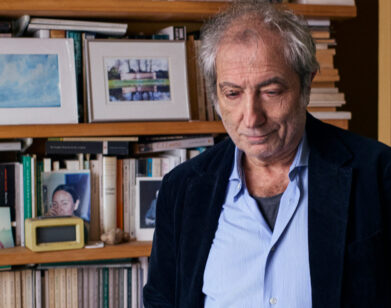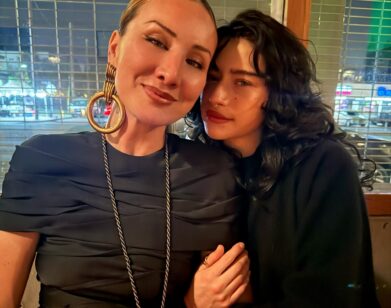Melissa Yancy’s Twisted Reckoning

ABOVE: MELISSA YANCY. PHOTO COURTESY OF TRIXIE SISON.
Melissa Yancy’s debut short story collection, Dog Years (University of Pittsburgh Press), is full of gorgeously twisted tales. Inspired by Yancy’s personal experience as a fundraiser for healthcare causes, many of the stories follow surgeons and scientists as they try to make sense of human suffering. There is, however, a sense of hard-earned whimsy to the narratives: a drunken aunt plans to take her naïve niece on a trip to Paris hoping to find the spot where she believes she died in a past life; a dying father regales his son with stories of being an interior decorator for Washington D.C.’s political elite.
Each character is sharply, humanly wrought, as if designed by the expert scalpels described in the collection’s fourth story “Hounds,” which involves a face transplant. Whether tackling death, illness, love, or loss, Yancy makes the strange feel familiar and the everyday full of mystery and wonder. We spoke with Yancy about synchronicity, extreme life experiences, epiphanies, the nature of stories, and how we know when to let go.
ROYAL YOUNG: I want to talk about synchronicity. Why do people turn to it and what circumstances in their lives might make them seek out a deeper meaning in what’s around them?
MELISSA YANCY: There’s such a fine line between coincidence, which can happen to you on a daily basis depending on the kind of person you are and how observant you are, and what you decide are the meaningful coincidences. Lots of people have a backstory about one incident that made them believe and gave them a new lens. Which, when they started applying it, they begin to find patterns everywhere. For some people, there are patterns; if you ask them if they believe in god, they will say the universe has order.
YOUNG: Absolutely. Sometimes it tends to be triggered by an extreme or a life experience that we find hard to process—dealing with events beyond our human grasp.
YANCY: Yes. It’s so hard to say whether it’s something you just see more when you are in that vulnerable space or it’s actually happening more. That’s the mystery of it. I’m a skeptic, but I always leave the door open for possibility. I do think when people are in state of grief, it seems to happen more often.
YOUNG: I’m not a skeptic—I don’t know what I am—but I do feel like when you are in a state of grief your mind is more open.
YANCY: You absolutely see things differently.
YOUNG: How do we measure our lives? Many of your characters are taking stock of their lives.
YANCY: You really hit on what connects a lot of these stories. Many of the characters are having a day of reckoning in one way or another. Whether they are putting themselves in front of god, their parents, themselves, that day of judgment is a theme that comes up. To me, that is one of the most important topics.
YOUNG: One of the things I related to so much in your stories is that there isn’t necessarily an obvious “eureka” moment, it’s more real.
YANCY: I think one of the things that happens with the epiphanies in the stories is there’s an acknowledgment that it’s very temporary—that it’s something the characters will have to learn again and again in their lives. They get it right now, but they can forget the second they walk out the door.
YOUNG: You have a line, “In lies there is hope.”
YANCY: I feel part of the job of story is simplification. That’s what a narrative arc is. You’re making something conform to an arc. By its nature, a story has to omit so much, but story works on people—that is what moves them to action.
YOUNG: What’s difference between internal and external wounds? I don’t want to be like, “I’m dying to talk about face transplant surgery,” but that’s kind of what this question is about.
YANCY: If I’m anxious about something, I often experience that as a physical symptom. I think there’s something wrong with me. I’ve been doing it my whole life, so at this point I know it’s probably nothing. I don’t have insomnia or panic attacks, I’ll just be convinced there’s something wrong with an inner organ. So that’s where that’s coming from, “Wow the face transplant is crazy,” and then all the psychology gets built out like a substructure. But most of these stories, it’s the stuff that’s on the surface—the actual surgical stuff was where I started and then it went from there.
YOUNG: How do you know when to let go? A lot of your characters struggle with that.
YANCY: I think certain things lend themselves to shortform versus a novel. Going back to the day of reckoning, you’re entering this character’s life at a very specific moment and it’s the only time you will see them. It kind of has to be, “Why this moment in their lives?” I’m not good at letting go—someone who I slighted in childhood, past relationships, places I’ve lived. Maybe on the surface it looks like I’ve ended things, but psychologically those things play out in my head for the rest of my life.
YOUNG: Me too. I wonder why there is so much emphasis on letting go. I think you can hold on to things in a non-neurotic way. There are all pieces of your life so why not honor and remember that?
YANCY: Yeah. There’s a fine line between torturing yourself—replaying things and having a lot of regret about them—and just reflecting on things as part of who you are. Unless you live in the same place where you grew up and have a profound stability in your life, you get increasingly fractured. That’s something the Yogi character is really dealing with in the book; she sees all these selves and because she is a slightly more enlightened figure even though she’s drunk, it doesn’t bother her. But she sees the distress it causes other people when they can’t create a coherent sense of self. For instance, if you completely change and someone hasn’t seen you in a decade, and they can’t imagine the path that led you there, it can be very distressing for them.
YOUNG: I agree. At the same time, when you talk about stability and sameness, there are people who are stuck in the past and can’t grow with you—relationships where you’re always going to be their third grade friend even if you’re 45.
YANCY: That happens a lot and often people don’t even realize it has. Even in narrative. Time is an essential subject here. It’s the subject that tortures me the most and the thing that, on some level, I’ll always be writing about.
DOG YEARS (UNIVERSITY OF PITTSBURGH PRESS) COMES OUT TOMORROW, OCTOBER 5, 2016.






